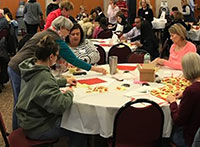 Volunteers at St. Matthew Church label bars of soap with the National Human Trafficking Hotline number for delivery to area hotels. (Photo provided by St. Matthew Parish)CHARLOTTE — When 15-year-old Theresa Flores accepted a ride home from the cute boy in her high school, she never imagined she would be drugged, raped and enslaved into the dangerous world of sex trafficking – all while living with unsuspecting parents in an upper-middle class neighborhood.
Volunteers at St. Matthew Church label bars of soap with the National Human Trafficking Hotline number for delivery to area hotels. (Photo provided by St. Matthew Parish)CHARLOTTE — When 15-year-old Theresa Flores accepted a ride home from the cute boy in her high school, she never imagined she would be drugged, raped and enslaved into the dangerous world of sex trafficking – all while living with unsuspecting parents in an upper-middle class neighborhood.
Now a national speaker, author and advocate, Flores shared her story and ways to spot and combat human trafficking with an audience of about 100 at a Saving Our Adolescents from Prostitution (SOAP) event March 23 at St. Matthew Church. Participants labeled bars of soap with the National Human Trafficking Hotline (1-888-373-7888) and delivered hundreds of bars with educational materials to area hotels in Charlotte.
“On my worst night, after being auctioned off to nearly two dozen men in a dingy, dirty, inner Detroit motel, the only thing that would have reached out to me was a bar of soap. With that in mind, I founded the SOAP Project in 2010 to help reach out to other victims,” Flores said. SOAP events are held throughout the nation and have involved over 100,000 volunteers distributing more than one million bars of soap.
The International Labor Organization estimates there are more than 40 million victims of human trafficking around the world. It estimates trafficking of human beings for forced labor or sexual exploitation generates $150 billion a year, making it the third-largest crime industry in the world behind drugs and arms trafficking.
“Most of us cannot comprehend the magnitude of the issue of human trafficking, let alone that it happens in our neighborhoods to our children,” said Lynn Anamasi, president of the Charlotte chapter of SOAP. “But we can all be part of the solution and make a difference if we know what to look for and join forces to stand up against it.”
The Catholic Church has been actively engaged in the fight against trafficking for many years. In an address to the United Nations, Pope Francis urged the world to show a greater commitment to battling “this abhorrent plague, a form of modern slavery.” He said, “Every year, thousands of men, women and children are innocent victims of labor exploitation, and sex and organ trafficking … This is ugly. It is cruel. It is criminal.”
In January, the Vatican released “Pastoral Orientations on Human Trafficking,” guidelines to help the Church fight against this evil. “Pope Francis’ insistent teaching on human trafficking provides the foundation for the present pastoral orientations which draw also from the longstanding practical experience of many international Catholic NGOs working in the field and from the observations of representatives of bishops’ conferences,” the text said.
The 40-page booklet is available at https://migrants-refugees.va/resource-center/documents. To learn more about SOAP and to get involved in the local chapter, email This email address is being protected from spambots. You need JavaScript enabled to view it.. More Catholic resources can be found at www.usccb.org/about/anti-trafficking-program/human-trafficking.cfm.
— Jenny Cox, Special to the Catholic News Herald. Jenny Cox is the Peace and Social Justice Ministry Leader at St. Matthew Church in Charlotte.
Demand slave-free supply chains
Though you may never encounter an enslaved person, the clothes you’re wearing, the phone or computer you are using or the food you’re eating may be a product of slave labor. Be an informed consumer. Encourage companies to monitor and address abuses in their supply chains. The following resources are just a few of the many that can help you ensure that your products are slave-free:
- Fair Trade International: products with the “Fair Trade” label are ethically produced and include fair labor conditions and prices as well as provisions for community development and environmental sustainability.
- My Slavery Footprint: helps you identify the extent to which your consumption habits are connected to modern-day slavery and human trafficking.
- Seafood Slavery Risk Tool: informs consumers and businesses about the risks of forced labor, human trafficking and child labor in fisheries.
You can also make an effort to purchase from businesses that are run by or support survivors. Purchases from companies such as Freeset Global, Relevée, Sari Bari, Shop for Freedom and To The Market, among others, support survivor rehabilitation, employment and the broader anti-trafficking movement.
— Source: www.humantraffickingsearch.org/take-action/for-businesses


